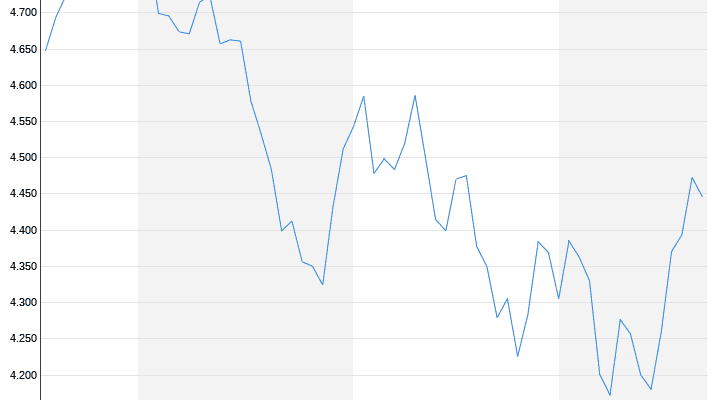Wall Street is resetting a little
Interest and war worries make investors hesitate
03/21/2022 at 9:44 p.m
The US Federal Reserve has made it clear that it does not want to be squeamish when it comes to the key interest rate. The first investors are puzzled as to whether the next rate hike could even be strong. At the same time, hopes of an early end to the war are dwindling. In this mixed situation, buyers on the US stock exchanges prefer to hold back.
The prospect of potentially even more aggressive interest rate hikes by the US Federal Reserve caused slight losses on Wall Street at the beginning of the week. The Fed stands ready to do so if necessary to fight rising inflation, said Fed Chair Jerome Powell. “If we conclude that it is appropriate to move more aggressively by raising interest rates by more than [einen Viertelprozentpunkt] At one or more meetings, we will.” Earlier, Federal Reserve Bank of Atlanta President Raphael Bostic said the central bank may need to raise rates more often this year to bring down inflation.
“The Fed has already signaled that it intends to do a much harder job of fighting inflation by holding out the prospect of six more rate hikes in 2022, but judging by recent comments there’s a good chance we might even get one at the May meeting 50 basis point hike,” said ThinkMarkets analyst Fawad Razaqzada. As expected, the Fed raised interest rates by 25 basis points last week.
At the same time, Powell committed himself to the goal of not triggering a recession with the forthcoming tightening of monetary policy. A “soft landing” is still possible, he said, citing three instances in the past 60 years where the Fed has succeeded.
the Dow Jones Index fell by 0.6 percent to 34,553 points. For the broader S&P 500 went down two points and the Nasdaq Composite lost 0.4 percent. With a view to the further developments in the Ukraine war, caution again spread among investors. Because the fighting continues with undiminished severity and there are no signs of a peaceful solution. Added to this were the higher oil prices, which fueled inflation concerns. These marked the highest level in two weeks. There is growing support in Europe for placing an embargo on Russian oil.
the dollar rose on the prospect of even higher interest rates in the US – the dollar index gained 0.3 percent. Gold was also in demand. The precious metal benefited from its inflation hedge status with Powell’s comments on high inflation in the US.
With the statements of Fed-Chairman Powell it went with the yields bond market straight up. The 10-year bond yield rose 15.6 basis points to 2.31 percent, the highest since May 2019. That puts yields on two- to 30-year bonds above the 2 percent mark, wealth manager Louis Navellier said. He sees the flattening curve as a counterforce to the Fed’s aggressive rhetoric. “Market forces are driving up Treasury yields and the Fed needs to respond,” said the participant.
the oil prices increased again: Brent from the North Sea rose in price by 7.6 percent to $116.20 per barrel (159 liters), US crude oil WTI climbed 7.3 percent to $112.38 per barrel.
Boeing lost 3.6 percent and were the weakest value in the Dow Jones index. It was triggered by reports that a China Eastern Boeing 737 crashed in southwest China with 132 people on board.
The shares of Berkshire Hathaway climbed to an all-time high. Class B shares were up 2.1 percent. Legendary investor Warren Buffett’s investment vehicle has announced that it will acquire insurer Alleghany for $11.6 billion. The papers from Alleghany increased by 24.8 percent.
